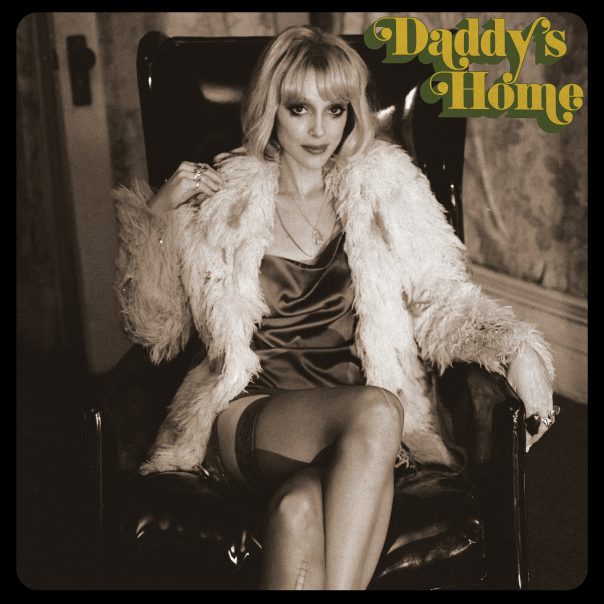ALBUM REVIEW: St. Vincent admits no accidents on difficult ‘Daddy’s Home’

St. Vincent, “Daddy’s Home.”
Americans, we like our heroes, heroines, alive with tragedy. A vicarious struggle pulls out our individualized triumphalism. The blessing is also the gift, as we like to say. Yet in truth, as St. Vincent sings on Daddy’s Home, casualties mount along the way.
Daddy’s Home
St. Vincent
Loma Vista Recordings, May 14
8/10
Annie Clark, an artist with clear appeal for millennial listeners, beckons with her sixth album under the St. Vincent moniker. She’s in glorious mess mode here, calling on love to save the day. Grandly set up for film noir, listeners are left with the femme fatale herself. Clark sings her heart into a gossamer web of cathartic jams and gems, achieving a patchwork landmark.
St. Vincent is all over the place. ‘Down And Out Downtown’ cruises in the grimy pimp sleaze of Superfly before welding the separate choral lushnesses of Soundgarden and Radiohead. On lead single “Pay Your Way In Pain,” Clark begins with the refrain while hard luck assails her. “Went to the bank to ch-check my checking,” she belts expectantly, under a melting sun, presaging mundane disappointment. A strong backing vocal team rocks to Clark’s every nuance, resounding with languid permanence. Though the tune ends abruptly, its haunting implications linger.
As the record progresses, lyrical and musical references emerge briefly and swim away, like fish in Virginia Woolf’s stream-of-writing consciousness. Still, transparent Pink Floyd tribute “Live In The Dream” sounds like none other than Annie Clark. To start the subsequent track, she rolls her eyes. “Hello on the dark side of the moon,” she croons, postulating hemispheres of human experience.
“To tell the truth, I lied,” Clark sings in the arresting “The Melting Of The Sun.” ‘The song gets raw and unrelenting, exploding like an emotional super-bloom. Great lyrics conduct a docent-tour through vocal history, as Nina Simone and Joni Mitchell get insider trading deets from Clark. The raw level grates on fraught nerves; however, and the yin becomes at times too much to bear. The song skirts the fragile edge of whole self-expression.
Elsewhere, classic rock mojo continues to lurk beneath the surface. Clark paraphrases more than she quotes, organically weaving musical reference points into her own symphonic pastiche. A Neil Young saloon piano jaunt kicks off “Pay Your Way In Pain” before the song takes a hard turn toward Clark’s electro-funk wheelhouse. Clark’s David Bowie fixation and some weird Roy Rogers glad-handing creep their ways in on a series of cuts. “Somebody Like Me” blends contemporary country with a melodramatic Smiths mood. Needless to say, “Hummingbird Interlude 2” is a washed-out throwaway.
Undertones of Sylvia Plath aside, Daddy’s Home carries a touch of ironic levity. “Daddy’s” arrival on record is marked by the realization that his home is prison. Told by Clark in metaphors, it sounds a lot funnier than it must have been in real life. Yet St. Vincent balances both sides of the entendre musically, conflating arrival and state, as the vivid all-female chorus chirps tidings of mischief.
Clark’s acclaim in indie circles, like her lyrical content, is no accident. With a background in formal training and an outside-the-box approach to pop, her work lands with a certain cachet. She knows what she’s doing every clear-eyed eagle-second of the way.
Therefore, there’s no bloody excuse for any missteps here. Lyrical through-lines and zeitgeist-processing folkways arrive at fully realized semi-songs. Or vice versa. It’s hard to tell where one blown out bass speaker over- or under-compensates for a blown-out master, blasted through a great set of headphones.
So while the record features only 10 real songs, each puts roots down. The listless “Laughing Man” provides a window into the gravitational span of the record. “Like the heroines of Cassavetes, I’m underneath the influence, baby,” Clark intones, scaring us a tad with her frankness. Cause for concern appears to be justified as the sultry singer goes on to reference “secret stitches” and suicidal ideation.
At its worst, Daddy’s Home spills the messy inner fullness of a wigged-out, drugged-up head case. Compelling sonic visions strain against the limitations of pop-song playlist format. There is a violence to the record that stirs dramatic potential. Rounding things out, “…At The Holiday Party” shows up with a redemptive touch of ’90s alt-rock uplift, another feather in Clark’s cap.
A difficult listening experience, Daddy’s Home goes to disparate corners in search of depths it can only fathom. But for gratifying bold impulses, Daddy’s Home is as good a playground as any. The latest from St. Vincent attacks the senses, and for this the LP should be praised. Yet, despite Clark’s sincerity, this set is a rough sell. Hard-up rags coexist with not-so-comforting reassurances. If any of these songs become even minor hits, we’ll mark it a W.
